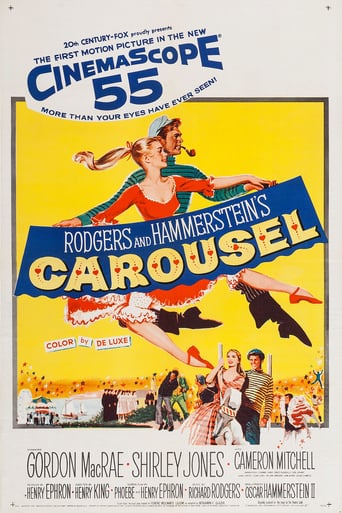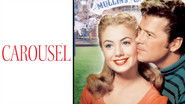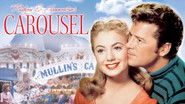thejcowboy22
Before I get into the crustaceans and potatoes of this motion picture I want to reminisce about the play Carousel which my older sister appeared. No, it wasn't on Broadway. Actually my sister was acting at the ripe old age of 13 on stage at Camp Ma-Ho-Ge in Bethel,New York. The cast of the production consisted of the group labeled the"Subbies " were to perform the play Carousel on stage for the rest of the campers. My sister Donna's name was proudly displayed in the program playing the supporting role of Cousin Nettie Fowler. The play focuses on the struggling Carnival barker Billy Bigelow and his love interest Julie Jordan. I figured my Sister would be insignificant and probably had a few lines here and there being a supporting actor. My Sister was in the background most of the play. When it was her turn to shine she barged through and ran with it singing "June Is Bustin Out All Over" and then took the background cast by the hand and lead them off stage through the crowd creating a makeshift conga line continuing the song as the crowd stood in deafening rousing applause. I was so proud of her. Unfortunately my Parents weren't present and that's the penalty for sending your kids off to sleep away camp.Most musicals up until that time, the mid 1950's had the narratives on the lighter side of life. Nothing drastic like Romeo and Juliet but on the lighter side. Lovers quarrels or a young actor or actress trying to break into show business was the theme with bountiful choreography and singing. Carousel the film has all those qualifications and then some. The story takes place in a coastal Maine fishing village coined Boothbay Harbor which also has a Carnival in it's town. Our star is the colorful, handsome, quick talking Billy Bigelow played by Gordon MacRae. Billy has a girlfriend Julie Jordan (Shirley Jones) who works at the local mill. They both get fired for different reasons. Billy gets fired by his boss a jealous Mrs. Mullins, (Audrey Christie) for spending more time with Julie. Julie gets dismissed from the mill for staying out past the required curfew. I assume they get married (not shown in the film), and move in with Cousin Nettie (Claramae Turner). Still infatuated with Billy, Mrs. Mullins offers Billy his job back at the carnival provided he leaves his wife for her. To complicate matters, Julie gets pregnant and Billy has trouble finding other work to provide for the expectant child. Desperation leads to tragedy. Just a great story layered with beautiful cinema-scope. The June Is Busting Out All Over scenes and the Clambake are brilliantly photographed. The duets with MacRae and Jones match each other perfectly and are pleasant to the ear. Just a fine mix of serious subject matter in a bustling New England Town. There are special effects used in the later scenes which will bring a tear to your eye but every time this musical is aired on Television I'm transformed back to that wonderful summer night off the Silver lake shore during the Mid-1960's and the show stopping act my sister Donna pulled off to the electrifying crowds at our camp.
JohnHowardReid
Copyright 1956 by 20th Century-Fox Film Corp. New York opening at the Roxy: 16 February 1956. U.S. release: February 1956. U.K. release: 21 May 1956. Australian release: 4 June 1956. Sydney opening at the Regent. 11,561 feet. 128 minutes.SYNOPSIS: The daughter of a carousel barker is ostracized by other children in a New England town at the turn of the century. NOTES: Second to "The King and I" as Fox's top-grossing domestic release of 1955-56. Fox's top box-office money-maker in Australia in 1956. Originally it was planned to shoot Fox's 49th CinemaScope movie in both 55mm CinemaScope and standard 35mm CinemaScope. Frank Sinatra, who had been signed for the part of Billy Bigelow (over the strenuous objections of Rodgers and Hammerstein), balked at making a print of every scene twice ("Everyone knows I've only got one good take in me!") and walked out. After MacRae had been signed, it was decided to shoot each scene on 55mm stock only and optically reduce to 35mm in the laboratory. The studio had intended to make 55mm projection prints available for roadshow engagements, but no cinema was prepared to pay the expense of re-equipping. So the movie was shown in 35mm CinemaScope everywhere. COMMENT: The lovely Shirley Jones is absolutely perfect as the vulnerable Julie, while critics with considerable justification predicted a big future for Barbara Ruick. (In fact she had no future in movies at all. This was her fifth and last film). Robert Rounseville, who had made his picture debut in Tales of Hoffmann (1951) was also deservedly praised, but he made no more pictures either. This was the only movie Claramae Turner ever made, but audiences were lucky enough to glimpse the entrancing Susan Luckey again in The Music Man (1962). The superlative dancing of Jacques D'Amboise was first seen in Seven Brides for Seven Brothers. After this spectacular follow-up, Producer Henry Ephron signed him for The Best Things In Life Are Free, a somewhat disillusioning experience which soured D'Amboise from Hollywood forever — except for the 1967 A Midsummer Night's Dream.Yes, everyone else is so great — Audrey Christie as the jealous Mrs. Mullin whose relationship with Billy is so cleverly conveyed by her gestures as well as her reactive words; Gene Lockhart in one of his last roles as the philosophical doctor/starkeeper; Cameron Mitchell, judiciously cast for once as the truly repulsive Jigger; John Dehner as a patronizing local moneybags; Richard Deacon as an obsequious policeman — it's a shame MacRae is so lackluster. Mind you, as said, King's sluggish, very loosely-framed direction does little to assist. Nor does Ephron's unnecessarily verbose script.Despite its shortcomings, "Carousel" is still a wonderfully uplifting musical experience. Rodgers' music is at its most haunting, most tuneful, most electric. Hammerstein's lyrics are perhaps at times a little too smart-alecky. The most impressively unforgettable numbers are the two dance set-pieces: "June Is Bustin' Out All Over" and "Louise's Ballet". Really zestful choreography, really expressive dancing make these numbers truly outstanding cinema pleasures.
Vern Sheldon-Witter
Of Rogers and Hammerstein's scores,Carousel blurs at time between Opera and Musical. The Soliloquy sequences in their virtuosity rivals many Operas. It is indeed said by the friends of Richard Rogers that he often thought of composing libretto settings to someday make it into their only full fledged Opera. Even without,it remains one of the Duo's time tested favorites-though not right away. In 1956 it was not the smash Oklahoma was. But with TV exposure to later generations,Carousel remains to many the most poignantly haunting of all Rogers and Hammerstein Musicals done by Hollywood.Frank Sinatra would have been a horrible miscast in this part, he would have had trouble sustaining the music the way it was already written. Gordon MacRae was perfect as Billy Bigelow, and Shirley Jones was the obvious choice for the role of Julie. The Dance sequences toward the end of the movie show the unmistakable stamp of Agnes De Mille. In a childhood full of Musicals,this is still one of my favorites.
jjnxn-1
One of the darkest if not the darkest of the big Hollywood or Rodgers & Hammerstein musicals this has an almost thoroughly unsympathetic anti-hero and somewhat of a doormat, at least at first, for a leading lady. However it also has some of the most beautiful music ever written sung by two great artists. "If I Loved You" is a song so full of cautious yearning and guarded longing with beautiful simplicity it tells you so much about Billy and Julie any other back story would be wasted. "You'll Never Walk Alone" is starkly moving and "June Is Busting Out All Over" provides some much needed levity in the heavy proceedings. Shirley Jones, at perhaps the peak of her loveliness, and Gordon MacRae, always one of the most attractive men in films with his All American robustness, with their chemistry and charisma make the two main characters people you care about which especially in Billy Bigelow's case is not the easiest accomplishment. As far as their singing performances Shirley as was always the case is in exquisite voice but the real standout has got to be Gordon, blessed with a gorgeous baritone and a fine expressive style, he is terrific here particularly in his big show-stopping set piece "Soliloquy". He was rushed in when Frank Sinatra walked out in a huff and it was a lucky break for the film, Sinatra with his at times boorish entitlement would have engendered zero sympathy, a vital component to making the character at least somewhat engaging. Sadly this was his last big picture since it was the end of the cycle for big Hollywood musicals. A waste of a superior talent. A beautiful film about imperfect people, and the redemption of one, that may not be politically correct if viewed through the prism of modern times but looked at from the perspective of the times it was made in is a great entertainment.



 AD
AD






